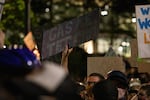
Mayor Ted Wheeler speaks at a press conference Aug. 30, 2020, in Portland, Ore. Wheeler faces mounting political pressure from all sides.
Bradley W. Parks / OPB
The day after a right-wing activist was shot and killed in the streets of Portland, Mayor Ted Wheeler received national headlines by charging that President Donald Trump was stoking hatred and violence.
“Do you seriously wonder, Mr. President, why this is the first time in decades that America has seen this level of violence?” Wheeler said in a nationally televised press conference. “It’s you who have created the hate and division.”
While Wheeler was on the air, Trump responded in real time with a series of tweets calling him a “wacky Radical Do Nothing Democrat Mayor” who has “watched great death and destruction of his city during his tenure.”
But the two men also have something in common:
“They’re both in fundamentally weak positions right now,” said Portland pollster John Horvick, “the president in his reelection efforts and the mayor in his. To the extent the public sees problems and points the finger at the incumbent, that’s a problem for both of them.”
Trump, beset by continuing COVID-19 deaths and wide economic pain, is seeking to shift the focus to law and order as protests continue following the May 25 police killing of George Floyd in Minneapolis.
For his part, Wheeler faces criticism nationally from the president but also on his own home turf as more than three months of nightly protests have often featured bitter confrontations between protesters and the Portland police — replete with images of tear gas clouds, baton-wielding cops, arson, smashed windows and more. Leaders of the city’s boisterous progressive community accuse Wheeler of unleashing the police on Black Lives Matter protesters while conservatives and some business owners increasingly denounce him for not cracking down harder on lawlessness.

A protester holds a sign critical of Mayor Ted Wheeler, who is also police commissioner, and his use of tear gas against demonstrators in Portland, Ore., July 22, 2020.
Bradley W. Parks / OPB
Many in what passes for the political middle in Portland say they find themselves discouraged and bereft of leadership.
“If it’s about Ted Wheeler’s management of the protests, you know, he’s in a difficult position,” said Horvick, the pollster for Portland-based DHM Research. “But if it’s about what the president is doing to Portland and he can be seen as standing up to the president, I just think that’s a much stronger position for him to be in.”
It’s not so clear how far that will carry Wheeler. Even many of his supporters admit to mixed feelings.
“I think there is a mismatch between what he would like to see happen,” said state Sen. Lew Frederick, D-Portland, “and his ability to get things done” within the entrenched bureaucracy and strict union protections at the police bureau.
Frederick, the senior Black lawmaker in the Oregon Legislature, lauded Wheeler for his “constant” support for Black Lives Matter. He questioned whether any of the mayor’s critics could find the right formula allowing peaceful protests to continue while curbing what Frederick calls the “agent provocateurs.” Those, he said, are people from both the left and right who are more interested in conflict than in advancing racial parity.
Some of the mayor’s backers want to stay out of the crosscurrents of social media and public eye. One prominent Black leader in civic affairs who would not talk on the record expressed unhappiness about some of the attacks on the mayor: “I don’t think dehumanizing the mayor and taunting and degrading him” is right, this person said. “That’s the kind of dehumanizing behavior Black Lives Matter is supposed to be against.”
At the time, this leader added, “I think there are people across the board that are very disappointed with Ted. I think they don’t necessarily want his opponent to be mayor, so they are caught in a conundrum.”
The disenchantment is strongest the closer one gets to the people out protesting every night. Six groups allied with the racial justice demonstrations on Sunday called for Wheeler to resign, a notion that the mayor quickly rejected with a terse “no” at his Sunday press conference.
The groups charged that Wheeler has allowed the police, which he oversees, to attack peaceful protesters while coddling right-wing groups such as Patriot Prayer that have often come into the city to brawl with left-wing groups.
“We are absolutely disgusted and disappointed by the brutality of police [action] being directed at Black Lives Matter while alt-right and white supremacists get escorted in and out of the city,” said Samantha Gladu, executive director of Next Up, a voter mobilization group formerly known as The Bus Project.
She and others expressed disdain that supporters of Donald Trump were able to caravan through Portland’s downtown on Saturday, including some demonstrators who fired paintball guns and bear mace at people on downtown Portland sidewalks. That’s when one of the men associated with the rally, Aaron J. Danielson, was shot to death. Police Chief Chuck Lovell said police tried and failed to divert the caravan from downtown. Police are still investigating the shooting.

Graffiti marks the exterior of City Hall Aug. 30, 2020, in Portland, Ore. A man was shot and killed the previous night as a Trump car caravan rolled through downtown.
Bradley W. Parks / OPB
Wheeler began the election year in a strong political position, barely falling short of more than 50% of the vote in a field of 19 candidates with no clear front-runner among the challengers. That forced him into a November runoff with Sarah Iannarone, an urban policy consultant who took 24% of the primary vote.
Iannarone has been a frequent presence at the protests and says on her website that, under Wheeler, the police “have consistently conspired with and abetted the alt-right while brutalizing antifascist protesters without consequences.”
Her campaign released a poll it paid for last month claiming that she and Wheeler each have a third of the vote while another third is undecided.
Horvick, whose polling is independent of the candidates, said he doesn’t have any recent survey data on the mayor’s race. But he noted that most Portland voters in recent years have been saying the city is on the wrong track, with positive marks for the city hovering in the 30s. And he said a recent poll he conducted of voters in Multnomah County — most of which is in Portland — showed that fewer than 30% thought the area was on the right track.
Even before the pandemic, Horvick said, local voters were upset about the homelessness crisis and the rising cost of housing. He said he thinks voters are “more frustrated by [Wheeler’s] inability to stop the protests, not his ability to accommodate the protests,” a view closer to Iannarone’s position.
It also doesn’t look like Iannarone will have a clear shot at Wheeler. On Tuesday, Gladu’s group, Next Up, announced through its action fund that it had endorsed the write-in campaign to elect Teressa Raiford as mayor. Raiford, who started Don’t Shoot Portland to seek more civilian oversight of police, finished third in the primary. Next Up says it mobilized volunteers to send out tens of thousands of texts and phone calls aiding candidates in the primary and plans to do it again in advance of the election.
Another big unknown in the election is how the city’s more conservative voters will react. Republicans only make up about a tenth of the city’s voting rolls, but non-affiliated voters, including some who lean toward the GOP, can have an influence in close races.
Wheeler is the more moderate of the three candidates for mayor. Still, these unprecedented times throw all political calculus into confusion.
Tim Nashif, a businessman long active in the Oregon Republican Party, said that as a lifelong Portlander, he’s long been pragmatic in understanding the limited influence he could have on city politics. He voted for Wheeler in the primary, dismissing the choice of Iannarone as a “left-wing defund-the-police socialist.”
But long before Trump spoke out about the Portland protests, Nashif said he became angered that Wheeler hasn’t done more to arrest and prosecute demonstrators breaking the law.
“I think he’s scared to death he’s losing his base” to Iannarone, Nashif said.
He’s struggling with how to vote in the mayor’s race.
“I’m looking at how he’s doing and the politics he plays,” Nashif said, “and it’s almost impossible for me to color that portion of the ballot.”